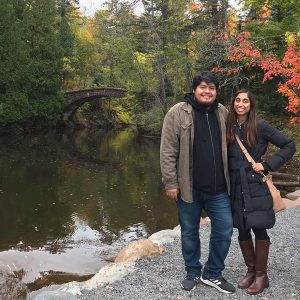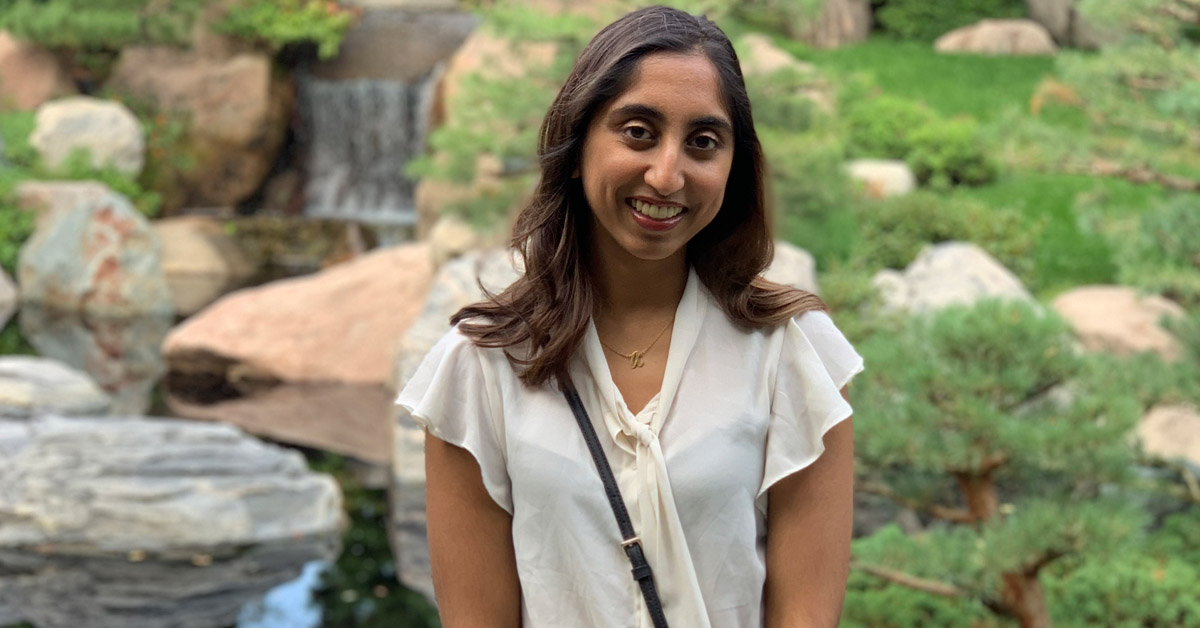Asha Elgonda is a second-year Epidemiology MPH student at the University of Minnesota School of Public Health. In her responses below, Asha shares what her experience has been as a public health student during a global pandemic. She also discusses how her Applied Practice Experience (APEX) has helped broaden her interest into other areas of public health.
How did you become interested in public health?
[Asha] I’ve always been interested in healthcare, and I knew that I wanted to focus on promoting health and health equity but not necessarily in a clinical setting. I heard about public health while attending undergrad at the U of M College of Biological Sciences, and with my microbiology background, I was super interested in infectious diseases.
I really started to learn more about public health when I was working at STERIS Laboratories. Our work focused on disinfectants and we would test their effectiveness. While working in the lab, I realized I liked the research aspect of it but I didn’t want to be so isolated and I wanted to be a bit more hands-on and help prevent diseases. When thinking about health, it’s important to be treated for what you have, but prevention is so important as well and people don’t always think about that.
Where are you completing your Applied Practice experience (APEX), and who is your preceptor?
[Asha] I just completed my APEX over the summer and I worked with Surgical Directions alongside Kartik Bhatt. Surgical Directions is based in Chicago and this was their first time doing this internship. It was a really good experience and one of their engagement directors, Audrey Coppola (MHA ‘14), is actually an alum from the U of MN School of Public Health. It was definitely different than I thought my applied practice would be as an Epi student. I thought it would be more statistical analysis and instead it was more about the business side of healthcare.
Why did you choose that site?
[Asha] Choosing a site was actually really hard. I was getting a lot of rejections because some students from last year were applying this year because of the pandemic. I was only looking at paid internships because I needed to be able to pay for my tuition as well to cover the cost of the credits. Having that as one of my goals limited my options. I initially found it on the SPH job board and it seemed really interesting. What pushed me to do it was talking with my mentor, Amanda Halvorson (MPH ‘17), who thought it would be a great experience for me even though it isn’t Epi focused.
What are you focused on for your Applied Practice experience?
[Asha] For my APEX, I interviewed different clinicians that worked within healthcare services, and we asked them about all the different pain points of their tasks and how they think their processes could be improved. We then took all of that data and created a perioperative process flow and a value stream map that identified the pain points that were described from our interviews with clinicians (which I unfortunately can’t share here because of proprietary information).
What impact do you hope your product will have on public health?
[Asha] I really hope that Surgical Directions can take our value stream map and share that information with all of their clients and hospitals they work with to find ways to improve the surgical process. This would benefit public health because with prevention, we don’t want the patient to come back because of a mishap during their surgery. Hopefully, our product and recommendations can help hospitals be more patient-centric and understand what’s best for their patients which will lead to healthier communities.
What are the benefits of applying your public health skills and knowledge in a real-world setting? [Asha] It was extremely interesting to ask clinicians and healthcare providers how they were doing during the COVID-19 pandemic. Future pandemics are bound to happen and that survey lens and data collection aspect of public health is really important for finding solutions on how we can handle things next time there’s a public health crisis. We need the community to tell us what they’re thinking and feeling so we can respond to their needs. In public health, it’s always good to take a collaborative approach to finding solutions.
Has your Applied Practice experience influenced your next steps in public health?
[Asha] Yes! Now, I really want to minor in Public Health Administration and Policy. I’ve learned it’s good to have a diverse skill set and even though I still want to be an infection preventionist, I’d like to dive more into how our current healthcare system functions. Everyone deserves the right to be treated and get the best care that they can get and this experience has really shown me what makes that possible in the real world.
Why did you choose to come to the U of M School of Public Health? 
[Asha] The tuition was a big determining factor as well as staying in the community that I love. Also, my family is here and my boyfriend and his family are here. Prior to coming to SPH, I knew the great relationship SPH had with MDH and other public health institutions here in the state so it just made sense to stay here since this is where I want to be.
What has been your favorite class so far?
[Asha] In the spring, I took Epidemiology and Control of Infectious Diseases (PUBH6385) with Professor Emeritus Alan Lifson and Assistant Professor Kumi Smith. It was really interesting to see the dynamic of him at the end of his public health teaching career and Kumi, who is earlier in her career, share their experiences and different perspectives. It’s also great seeing another woman of color in that space who I can connect with and learn from.
What do you like about being in Minnesota?
[Asha] The accessibility to walk around, bike around, take public transportation and being able to easily get around is really helpful. Minnesota is special to me because my grandfather decided to move here from India in his 30s to attend the University of Minnesota. He changed his entire career to come here for a better life and because of that my parents and I are all here.

